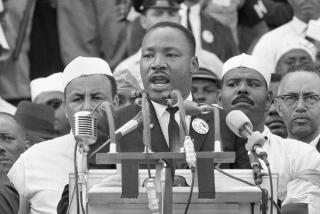The greatest thing Andrew Jackson never said
- Share via
A LINE from Andrew Jackson has been making the rounds lately: “One man with courage makes a majority.” This aphorism is today known as Jackson’s most famous saying. It adorns T-shirts, mugs and posters. The ACLU and the Christian Coalition invoke it. Politicians repeat it endlessly, including, recently, Gov. Arnold Schwarzenegger.
But did Jackson really say it? Curiously, although everyone has heard it quoted from him and therefore “knows” that he said it, no one can pinpoint when or where. Bartlett’s Familiar Quotations, a standard source, attributes it to Jackson without naming time or place. Still more curiously, this memorable phrase appears in no biography of Jackson or history of his era. Certainly Jackson’s many splendid biographers would not have let a gem like this slip past them.
Yet they never quoted it. In fact, the idea that Jackson coined the phrase did not surface until he had been dead for many years.
Here at The Papers of Andrew Jackson at the University of Tennessee, we collect and publish copies of every authenticated Jackson writing and utterance. We have nothing to corroborate his authorship of this line. Although it is impossible to prove that someone did not say something, there is no evidence of any kind to show that Jackson did say the line. So how did Jackson’s paternity work itself into our minds? The answer is a classic case of how historical errors arise. In 1860, author James Parton published a three-volume “Life of Andrew Jackson.” Thoroughly researched and vividly written, Parton’s book became the standard biography for his generation. Historians consult it to this day.
On the title page of each volume, Parton placed the epigraph “Desperate Courage Makes One a Majority.” He framed it within quotation marks but not in any way to suggest that Jackson himself had said it. In fact, Parton did not mean it as a compliment, and Jackson, were he alive to see it, certainly would not have taken it as such. Parton did not admire Jackson. He thought him a headstrong ignoramus whose desperate courage overrode other men’s good sense.
Yet somehow, in the course of endless repetition, this censorious comment about Jackson was prettied up and attributed to Jackson. The process was well underway by the 1930s and complete by the end of the 1950s.
In 1968, Jackson’s authorship made it into Bartlett’s, enshrined as truth for generations to come.
There is a lesson here that historians know well. People love to attribute clever sayings to famous people like Jackson and, especially, Abraham Lincoln. Be skeptical. Go back to the original historical record. When a striking quotation like this one shows up out of nowhere, there’s likely something fishy going on.
More to Read
Sign up for our Book Club newsletter
Get the latest news, events and more from the Los Angeles Times Book Club, and help us get L.A. reading and talking.
You may occasionally receive promotional content from the Los Angeles Times.










